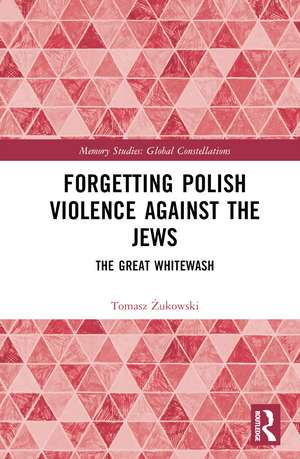Forgetting Polish Violence Against the Jews: The Great Whitewash: Memory Studies: Global Constellations
Autor Tomasz Żukowskien Limba Engleză Hardback – 17 dec 2024
Considering the ways in which Polish culture displays symptoms of a suppressed and violent memory while obstinately refusing to see the meaning of such symptoms, the author shows how the narrative of the Holocaust, in threatening the self-image of the community, causes a continuous anxiety and thus compulsive and neurotic reactions. Through analyses of a wide range of literary, journalistic, commemorative and cinematic texts, Forgetting Polish Violence Against the Jews sheds light on a set of narrative and discursive models connected with social practices, which serve to discipline individuals – especially Polish Jews – while generating pressure to defend both habits of silence and also an idealized self-image of the Polish Christian majority.
This book will appeal to scholars with interests in memory studies, cultural studies, Holocaust studies and psychoanalytic studies.
Din seria Memory Studies: Global Constellations
-
 Preț: 326.49 lei
Preț: 326.49 lei -
 Preț: 318.01 lei
Preț: 318.01 lei - 9%
 Preț: 1004.85 lei
Preț: 1004.85 lei -
 Preț: 288.30 lei
Preț: 288.30 lei -
 Preț: 362.57 lei
Preț: 362.57 lei - 18%
 Preț: 1003.43 lei
Preț: 1003.43 lei - 18%
 Preț: 1001.55 lei
Preț: 1001.55 lei -
 Preț: 389.38 lei
Preț: 389.38 lei - 14%
 Preț: 311.03 lei
Preț: 311.03 lei -
 Preț: 389.11 lei
Preț: 389.11 lei - 18%
 Preț: 892.61 lei
Preț: 892.61 lei -
 Preț: 387.65 lei
Preț: 387.65 lei -
 Preț: 410.16 lei
Preț: 410.16 lei -
 Preț: 326.49 lei
Preț: 326.49 lei - 19%
 Preț: 257.25 lei
Preț: 257.25 lei -
 Preț: 385.54 lei
Preț: 385.54 lei - 18%
 Preț: 997.14 lei
Preț: 997.14 lei - 18%
 Preț: 1004.72 lei
Preț: 1004.72 lei -
 Preț: 389.38 lei
Preț: 389.38 lei - 14%
 Preț: 297.79 lei
Preț: 297.79 lei - 16%
 Preț: 273.05 lei
Preț: 273.05 lei -
 Preț: 423.30 lei
Preț: 423.30 lei - 18%
 Preț: 895.32 lei
Preț: 895.32 lei - 19%
 Preț: 257.68 lei
Preț: 257.68 lei - 15%
 Preț: 296.95 lei
Preț: 296.95 lei -
 Preț: 317.29 lei
Preț: 317.29 lei - 18%
 Preț: 1001.51 lei
Preț: 1001.51 lei - 18%
 Preț: 919.43 lei
Preț: 919.43 lei -
 Preț: 389.38 lei
Preț: 389.38 lei - 18%
 Preț: 1001.87 lei
Preț: 1001.87 lei
Preț: 1003.43 lei
Preț vechi: 1223.70 lei
-18% Nou
Puncte Express: 1505
Preț estimativ în valută:
192.01€ • 209.22$ • 161.79£
192.01€ • 209.22$ • 161.79£
Carte tipărită la comandă
Livrare economică 23 aprilie-07 mai
Preluare comenzi: 021 569.72.76
Specificații
ISBN-13: 9781032512785
ISBN-10: 1032512784
Pagini: 278
Dimensiuni: 156 x 234 mm
Greutate: 0.54 kg
Ediția:1
Editura: Taylor & Francis
Colecția Routledge
Seria Memory Studies: Global Constellations
Locul publicării:Oxford, United Kingdom
ISBN-10: 1032512784
Pagini: 278
Dimensiuni: 156 x 234 mm
Greutate: 0.54 kg
Ediția:1
Editura: Taylor & Francis
Colecția Routledge
Seria Memory Studies: Global Constellations
Locul publicării:Oxford, United Kingdom
Public țintă
PostgraduateCuprins
Introduction: What We Know Doesn’t Matter Part I: Bystanders’ Trauma? 1. Witnesses to Their Own Aggression: The Beater by Ewa and Czesław Petelski (1963) 2. What the Excluded Say: Henryk Grynberg’s The Jewish War (1965) and The Victory (1969); Paweł Łoziński’s Birthplace (1992) 3. “Say I Am Innocent” 4. Jewish Graves as the Polish Unconscious: The Holocaust in Polish Cinema after 2000 Part II: Anxiety and Self-Image 5. First Reaction to the Holocaust: “Protest” by Zofia Kossak-Szczucka (1942) 6. Collective Aggression in Holy Week (1946) by Jerzy Andrzejewski 7. How Not to See What Has Just Been Said 8. The Same Story Whitewashed: Andrzej Wajda’s Holy Week (1995) Part III: The Righteous - The Hinge of Self-Fashioning 9. Social Practice 10. The Rescue of Jews as a Polish Self-Portrait: The Samaritans: Heroes of the Holocaust by Władysław Bartoszewski and Zofia Lewin (1966) 11. Narrative Patterns 12. Ashamed Jews: The Righteous During the 1968 Antisemitic Movement 13. Unique or Different Models? Part IV: The Antisemite Becomes Righteous 14. Discursive Model 15. Border Street by Aleksander Ford (1949) 16. 60 Years Later: In Darkness by Agnieszka Holland (2011) 17. Is an Alternative Story Possible? Aftermath by Władysław Pasikowski (2012) Part V: The Same Once Again - Our Class by Tadeusz Słobodzianek (2010) 18. After Neighbors by Jan Tomasz Gross: Regress 19. An Unnoticed Part of the Drama 20. Reception
Notă biografică
Tomasz Żukowski is Associate Professor of Modern Polish Literature and Culture in the Department of Contemporary Literature and Social Communication at the Polish Academy of Sciences. He is the co-author of Philo-Semitic Violence: Poland's Jewish Past in New Polish Narratives (2021), and the co-editor of The Holocaust Bystander in Polish Culture, 1942-2015: The Story of Innocence (2021).
Descriere
During the Holocaust, Polish bystanders were witnesses not only to Nazi crimes but also to their own collective violence towards Jewish neighbours. This book shows how these memories continue to be distorted and silenced in Polish culture.
